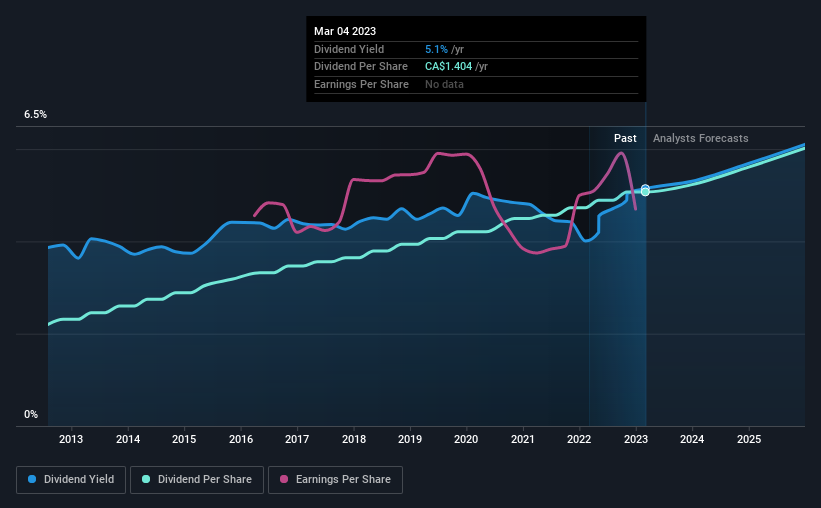Don't Buy TELUS Corporation (TSE:T) For Its Next Dividend Without Doing These Checks
Regular readers will know that we love our dividends at Simply Wall St, which is why it's exciting to see TELUS Corporation (TSE:T) is about to trade ex-dividend in the next 4 days. The ex-dividend date is usually set to be one business day before the record date which is the cut-off date on which you must be present on the company's books as a shareholder in order to receive the dividend. The ex-dividend date is important as the process of settlement involves two full business days. So if you miss that date, you would not show up on the company's books on the record date. Thus, you can purchase TELUS' shares before the 9th of March in order to receive the dividend, which the company will pay on the 3rd of April.
The company's upcoming dividend is CA$0.35 a share, following on from the last 12 months, when the company distributed a total of CA$1.40 per share to shareholders. Calculating the last year's worth of payments shows that TELUS has a trailing yield of 5.1% on the current share price of CA$27.31. Dividends are an important source of income to many shareholders, but the health of the business is crucial to maintaining those dividends. We need to see whether the dividend is covered by earnings and if it's growing.
View our latest analysis for TELUS
Dividends are usually paid out of company profits, so if a company pays out more than it earned then its dividend is usually at greater risk of being cut. TELUS paid out 117% of profit in the past year, which we think is typically not sustainable unless there are mitigating characteristics such as unusually strong cash flow or a large cash balance. A useful secondary check can be to evaluate whether TELUS generated enough free cash flow to afford its dividend. It paid out 102% of its free cash flow in the form of dividends last year, which is outside the comfort zone for most businesses. Cash flows are usually much more volatile than earnings, so this could be a temporary effect - but we'd generally want to look more closely here.
Cash is slightly more important than profit from a dividend perspective, but given TELUS's payouts were not well covered by either earnings or cash flow, we would be concerned about the sustainability of this dividend.
Click here to see the company's payout ratio, plus analyst estimates of its future dividends.
Have Earnings And Dividends Been Growing?
When earnings decline, dividend companies become much harder to analyse and own safely. If business enters a downturn and the dividend is cut, the company could see its value fall precipitously. So we're not too excited that TELUS's earnings are down 3.0% a year over the past five years.
Another key way to measure a company's dividend prospects is by measuring its historical rate of dividend growth. Since the start of our data, 10 years ago, TELUS has lifted its dividend by approximately 8.7% a year on average. That's intriguing, but the combination of growing dividends despite declining earnings can typically only be achieved by paying out a larger percentage of profits. TELUS is already paying out a high percentage of its income, so without earnings growth, we're doubtful of whether this dividend will grow much in the future.
The Bottom Line
Has TELUS got what it takes to maintain its dividend payments? Not only are earnings per share declining, but TELUS is paying out an uncomfortably high percentage of both its earnings and cashflow to shareholders as dividends. This is a clearly suboptimal combination that usually suggests the dividend is at risk of being cut. If not now, then perhaps in the future. Bottom line: TELUS has some unfortunate characteristics that we think could lead to sub-optimal outcomes for dividend investors.
Although, if you're still interested in TELUS and want to know more, you'll find it very useful to know what risks this stock faces. Our analysis shows 3 warning signs for TELUS that we strongly recommend you have a look at before investing in the company.
A common investing mistake is buying the first interesting stock you see. Here you can find a full list of high-yield dividend stocks.
Have feedback on this article? Concerned about the content? Get in touch with us directly. Alternatively, email editorial-team (at) simplywallst.com.
This article by Simply Wall St is general in nature. We provide commentary based on historical data and analyst forecasts only using an unbiased methodology and our articles are not intended to be financial advice. It does not constitute a recommendation to buy or sell any stock, and does not take account of your objectives, or your financial situation. We aim to bring you long-term focused analysis driven by fundamental data. Note that our analysis may not factor in the latest price-sensitive company announcements or qualitative material. Simply Wall St has no position in any stocks mentioned.
Join A Paid User Research Session
You’ll receive a US$30 Amazon Gift card for 1 hour of your time while helping us build better investing tools for the individual investors like yourself. Sign up here

 Yahoo Finance
Yahoo Finance 
